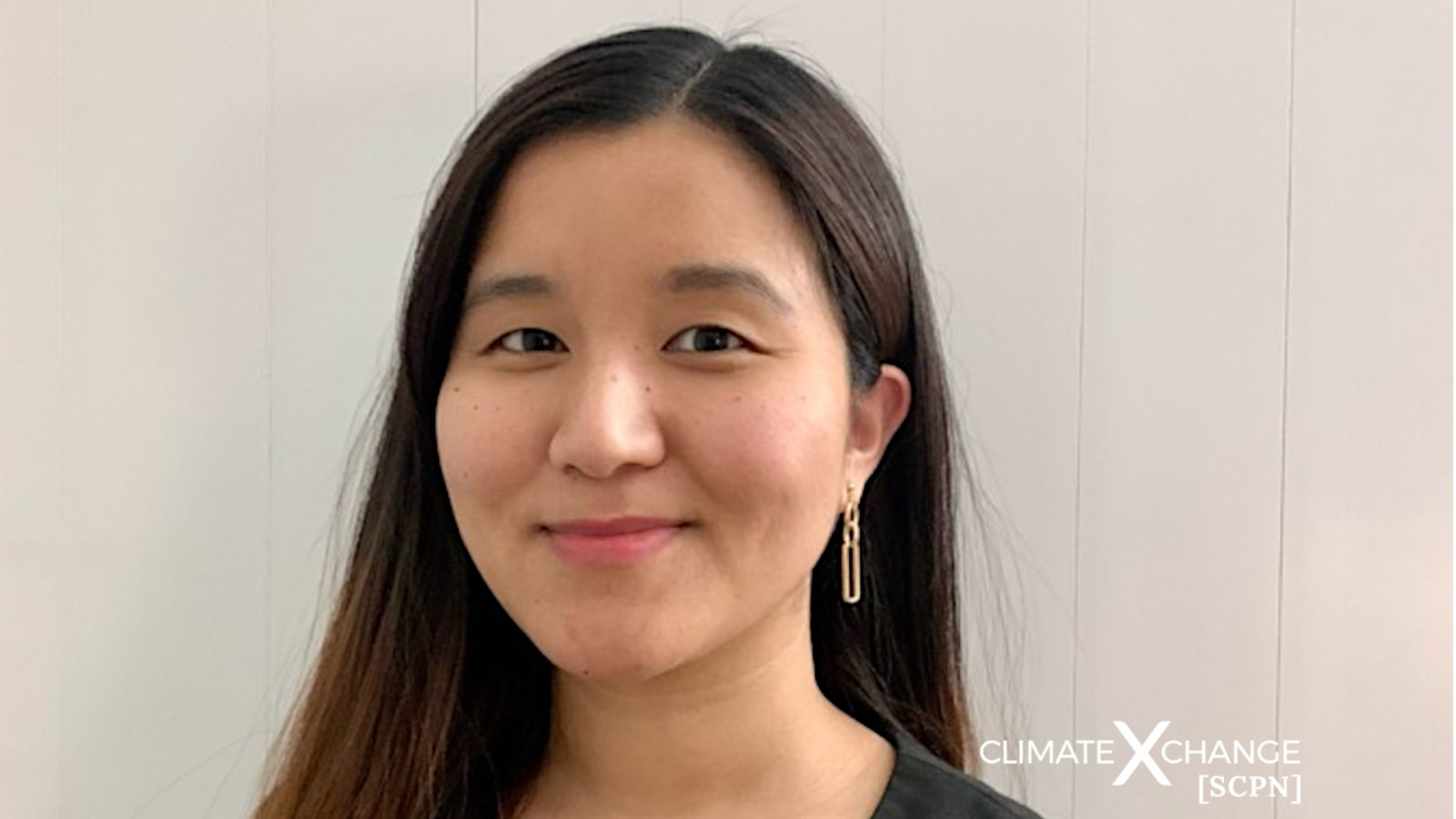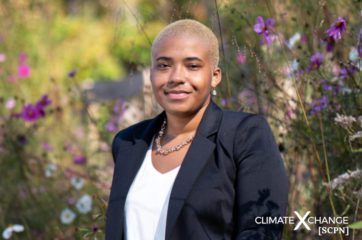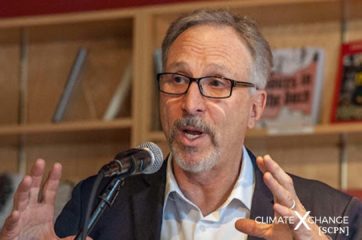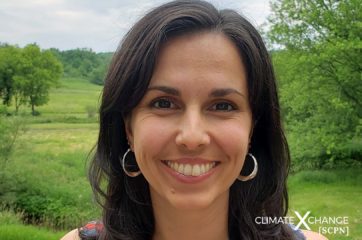All across the country, members of our State Climate Policy Network (SCPN) are fighting to make an impact on climate change in their communities. We have individuals in our Network from all 50 states, each experiencing climate change differently in their local areas and finding unique solutions to build resiliency efforts.
Dawa is a Sherpa-Nepali woman, an organizer, and a graduate of The New School with a Master’s in Environmental Policy & Sustainability Management. She is passionate about addressing water issues through the lens of environmental injustice. Dawa joined Earthjustice’s New York Office in 2016 as a Legal Practice Assistant and transitioned into the role of Executive Assistant to support the Vice President of Litigation for Healthy Communities. Dawa currently provides administrative, financial management, research & writing, and logistical support to the Sustainable Food and Farming Program and Toxic Exposure & Health Program based in the New York Office.
Julia Hananel: Tell me a little bit about yourself and your background – where are you from, and how did you get interested in environmental issues?
Dawa Sherpa: I was born and brought up in Nepal, in the capital city, Kathmandu. Up until tenth grade, I was in a boarding school. After that, I went to Northeast India to do my years 11 and 12.
In Kathmandu, there are a lot of issues with really bad infrastructure, and a lot of issues to do with water scarcity. Growing up there, you would experience issues where the water wasn’t running, or that the water was running too hard – like, periods of literally two hours in the morning where the water would keep coming and you’d have to fill all these buckets.
It was just really bad planning in terms of the infrastructure that was built, and the city itself just keeps growing, like, overnight at extreme speed. The water pipes and anything to do with management issues are really bad. Also, a lot of it has to do with politics and corruption and all those aspects. There’s this tremendous growth of urban populations, but the planning isn’t thoughtful of how to provide for the people.
When I was growing up, Nepal was also going through a civil war. We had this huge crisis because the whole monarchy was falling apart – the whole family was murdered. Then there was the civil war where people were coming in power, and there was this whole transition towards democracy. While this was all happening, I was in sixth and seventh grade.
It was such a cliche we heard growing up, how we learned that Nepal is one of the richest countries in terms of water resources. But I’m thinking about how people had to store and save their water, and to function in that manner, that just doesn’t sit well with me.
And when I was in India, it was one of the northeastern parts of India. So even there, the access to water was really, really difficult – you’d see people standing in line filling up their buckets and then taking them home. All of this was really apparent as I was growing up, so I was always really interested in water issues. One of the key things that I realized was that having proper infrastructure makes a huge difference, and that’s how I got really interested in engineering and resolving the issues from that lens.
Julia Hananel: Tell me more about how you landed on studying environmental issues in school, and ultimately choosing to pursue this as a career path.
Dawa Sherpa: When I came to the U.S., I was a biology major at my school in Missouri, and one of my professors was really interested in environmental issues. I’m someone who’s really influenced by my mentors, and this professor was encouraging me to expand my mental consciousness. This exposed me to things such as ecofeminism, the role that religion plays in environmental faith, and the Global South/Global North dynamic.
After school, I moved to New York and started looking for environmental organizations that I could work with. I came across Earthjustice – they’re an environmental law group. I was always spending time thinking about the science of environmental issues, but now I was looking at the law aspects of them. When I started working at Earthjustice, I was hearing about the cases – all of the pipelines that were being stopped in New York State and Pennsylvania. The office was doing amazing work with stopping fracking and stopping pipelines. At the same time, I was also supporting the Vice President of Litigation for Healthy Communities, who was a really big advocate. These roles were how I expanded into this whole career of environmental justice. Like I said before, I’m someone who is really influenced by the people that I work for, and she was a really good mentor.
Then, I was recommended to go to grad school at The New School, in New York City. My program there was led by my boss at the time (the Vice President of Litigation for Healthy Communities). While I was doing my Master’s, I came across a professor – he is currently leading the program now – who has a really strong background in Indigenous cultures and Indigenous sovereignty. His class was unlike any other class I’ve taken, and I’ve taken a lot of climate change classes. Usually we will focus only on greenhouse gas emissions, but in his class we were looking at the impacts on people on the ground.
That really changed my perspective thinking about climate change, because there’s the whole carbon aspect to it, which is everywhere – that’s the key thing that is tied to all the reports, all the publications, anything that comes out of a climate conference. But looking at it from the perspective of thinking about the Indigenous sovereignty, and thinking about all the movements that are happening, especially with pipelines – those things tie really well together. That’s how I got really exposed to the struggles of Indigenous people in the Global South, and in the U.S. and Canada.
Julia Hananel: How did learning about Indigenous cultures shape your perspective on climate issues?
Dawa Sherpa: Learning about the connection of environmental issues and Indigenous people made me reflect a lot on my background because, like I said, I grew up in Kathmandu, but I was really in a bubble when it came to the education I received.
Just a bit of background – all our textbooks are from India, and India has a colonial history. Publications and resources from the Department of Education come from India. Nepal is heavily influenced by India, and just given the background of India – it was under the British colonial system for a long time – that really influenced how Nepal is situated and how we make policies.
It was really funny how I discovered that I was one of the Indigenous cultures in Nepal – Sherpa. That was a discovery where I was like, ‘This is so embarrassing that I didn’t know – how did this happen? How did I only discover this when I’m almost 30?’ That whole process brought me to think more about Indigenous cultures.
I started asking my parents about it, I was like, “Did you guys know this?!” I was just never exposed to it and it was never passed down. That whole erasure from one generation to another is really significant. Right now I’m doing a lot of work with communities back in South Asia and Nepal, and now I use this framework to think about the issues and policies that are happening.
Julia Hananel: I’ve heard a lot about the projects of the Earthjustice group before, they do such crucial work for the environment through our legal system. As someone who’s been working there for several years, how would you describe their mission, and how does your work with environmental advocacy tie in with Earthjustice?
Dawa Sherpa: So Earthjustice is a law firm, and we do a lot of litigation against corporations, litigation against the government, and litigation against any standards that the city, state, or federal government has put forward. All the litigation that’s happened has represented a coalition of communities, so this is not private litigation.
For example, in cases like the Dakota Access Pipeline –- that was being represented by Earthjustice, and the legal work was being done by Earthjustice. We function as almost behind-the-scenes work because when there’s a movement happening, the focus is on those on the ground and those fighting. But I think Earthjustice does a really good job of moving the process forward and just focusing on the work that we’re doing. All the litigation is for free, so all the rest of the financial support for the organization is as a non-profit. It’s all like donations, grants, fundraisers, that type of thing.
Julia Hananel: Are there any noteworthy projects that you want to share?
Dawa Sherpa: After one of my previous supervisors transitioned into another organization, I ended up supporting two programs, the Toxic Exposure and Health program and in the Sustainable Food and Farming program.
In addition to that, one of the things I’m doing is a lot of work related to food issues, which is something that needs a lot of attention in terms of thinking about waste as an inequality issue, and waste as an infrastructure issue.
Just to give a background, thinking about environmental justice in the U.S., a lot of the waste facilities were placed in communities that were being disproportionately impacted. That’s when the whole environmental justice movement took off, with mostly African American communities. That translates to today, for example, if you look at the borough of Manhattan, if you look at where New York City is placing all the waste, there are a lot of racial disparities.
Food waste is really toxic – once it’s in a landfill it kind of leeches into the ground, and then it causes a lot of water pollution. The other issue is that it releases a lot of methane. And you also have to look at who is wasting the food – there is a lot of disparity in that whole sector.
There has been a push to make regulations more strict. Starting this January, New York began to make sure that food producers – a lot of bigger facilities that are producing food waste – are required to recycle. – The first thing we need to do is to make sure that they separate out the food that can be donated. Whatever can’t be donated will go to an organic recycling facility.
Something I worked on with my team was submitting a public comment letter, highlighting what can be done better in terms of food waste, and I reached out to a lot of local advocates and interviewed them for this. One of the biggest things that needs to be done is opening more organic food waste facilities. The problem with some of the current laws and regulations is that they are not very effective, there are a lot of loopholes, and there’s no teeth to the laws.
Julia Hananel: I’m so glad that there are groups like Earthjustice and advocates like you out there fighting for change! Thank you so much for your time.
Additional info: check out Dawa’s comments, fighting for more food waste regulations!
Food Waste public comments submitted to NYS Department of Environmental Conservation.









